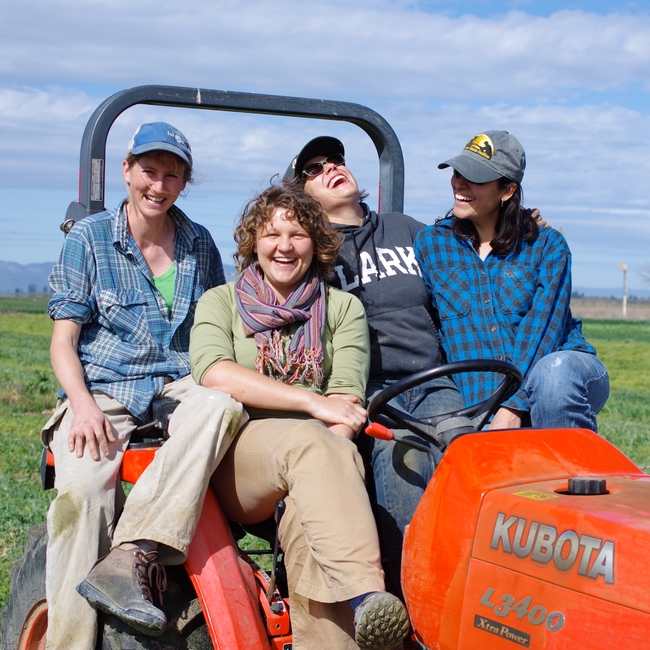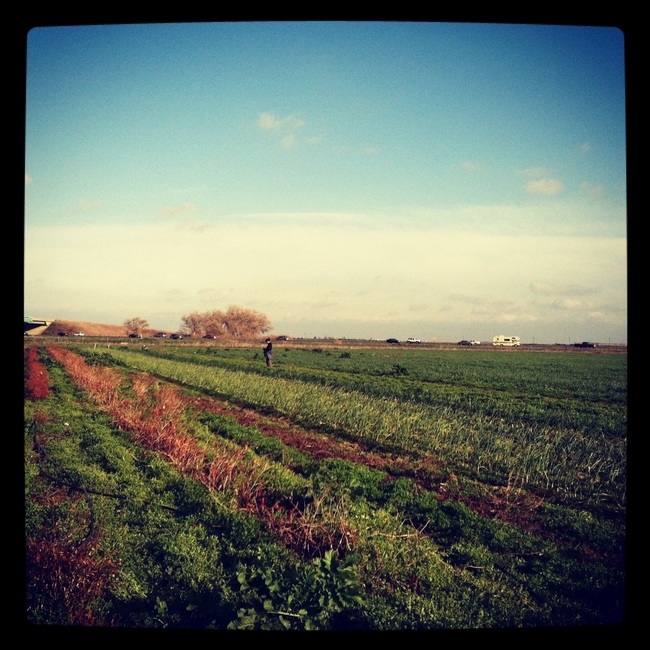Posts Tagged: nectarines
UC explores ladderless peach and nectarine orchards
Can shorter peach and nectarine trees reduce labor costs?
The answer may be developing soon at a 4-acre test orchard south of Fresno, where University of California researchers are planting semi-dwarfing rootstocks as part of a large, integrated experiment on virtually every aspect of peach and nectarine production.
“We're designing ‘ladderless' orchards, which have the potential to cut labor costs by 50 percent or more and improve worker safety,” said UC Cooperative Extension specialist Ted DeJong, a plant physiology professor at UC Davis. DeJong and Kevin Day, a Cooperative Extension farm advisor in Tulare County, are leading the extraordinary experiment.
Conventional peach and nectarine trees grow about 13 feet tall. Setting up, climbing and moving ladders to prune the trees and harvest fruit consumes about half the workday. Ladders are dangerous, too, which is why peach and nectarine growers pay about 40 percent more for workers' compensation insurance than growers who work with more low-lying commodities, like grapes.
Developed by breeders at UC Davis, the new rootstocks will produce trees that grow about 7 or 8 feet tall and can be pruned and harvested from the ground. With the right orchard management — which Day and DeJong will test at their plots at the UC Kearney Agricultural Research and Extension Center, near Fresno — the shorter trees could produce just as much high-quality fruit as their lofty kin.
“Ladderless orchards would be huge for our industry,” said Bill Chandler, who grows several varieties of peaches and nectarines on his 250-acre Chandler Farms in Selma, California. “There are so many costs associated with ladders that many growers are switching over to almonds just to stay in business. It costs me $1,400 an acre to thin our trees.”
“Even with conventional rootstocks, I prune my trees so workers can take two fewer steps on the ladder come harvest time,” he said. “And the savings are huge, even with that. It's important to keep farm work safe. And it's important to keep farming viable, or else we'll be getting all our produce from overseas.”
Shorter trees are just one of the elements of DeJong's and Day's experiment, which explores best practices for keeping peach and nectarine production economically and environmentally sustainable. Funded by the UC division of Agriculture and Natural Resources, their model orchard will integrate virtually every UC pomology advancement in the past 30 years.
You can read more at: http://www.caes.ucdavis.edu/news/articles/2014/08/ladderless-peach-and-nectarine-orchards-explored
The promise of peaches
Tomatoes grow fine in my Sacramento backyard. I can usually count on plenty of basil, more zucchini than the neighbors will take, some snow peas, chard and kale, a few small peppers and eggplants and whatever salad greens survive the slugs (in other words, lots of arugula). We have oranges and grapefruit, but I wouldn't even try to grow peaches or apricots. It takes a farmer to grow peaches. It takes a good farmer to grow good peaches. It takes a good farmer and good weather to grow Blenheim apricots.
Instead of planting a peach tree, I joined a fruit community supported agriculture (CSA) program, promising to pay $15 a week for a box of fresh fruit every week from June 7 until October 4. By joining I am agreeing to share the risk and the promise of the harvest of a four-acre fruit orchard with four part-time beginning farmers growing fruits and vegetables just west of Davis.
Emma Torbet and Sasha Klein started growing vegetables as The Cloverleaf at Bridgeway Farms about two years ago. Rich Collins, land-owner and sponsor of The Cloverleaf, planted the fruit trees four years ago but doesn't have the time to manage the orchard, so he leased it to the Cloverleaf farmers this year. Aubrey White and Marisa Alcorta joined as farm partners also this year. Together, the four women work long hours on weekends and evenings to farm an acre and a half of vegetables and the four acres of peaches, apricots, nectarines and figs. Like most beginning farmers, all four work full-time at other jobs; Torbet at the Russell Ranch Sustainable Agriculture Facility, Klein with the Farmer Veteran Coalition, White with the UC Agricultural Sustainability Institute, and Alcorta with the National Center for Appropriate Technology.
The Cloverleaf at Bridgeway Farms offers a chance that is, Aubrey White says, "both attractive and terrifying, with everyone trying to make it happen while keeping their jobs." The monetary investments were low, as they have no buildings or heavy equipment, and Collins offered a very attractive lease arrangement to encourage the new farmers. The vegetable land is certified organic and the orchard land is in transition to organic. The part that is terrifying is the risk of crop failure and poor yields that all farmers face.
The Cloverleaf farmers all have some farming experience, but the orchard presented new challenges. White started with the UC Master Gardener Program in Los Angeles, worked with urban farms and community gardens, and for two years at the UC Davis Student Farm. But, she says, taking on the orchard involved a "crazy different learning curve for three out of four of us." Even with all of her agricultural experience, she felt at a disadvantage not having a science background, particularly not having the soil science information to best manage the orchard.
Luckily, the new farmers found a mentor. Organic farmer Carl Rosato, owner of Woodleaf Farm near Oroville, is the soil scientist peach farmer that every beginning orchard manager would love to know. Rosato has taken on advising the Cloverleaf farmers as they learn to confront peach leaf curl and blossom rot by keeping the soil healthy and pruning the trees to ensure good air ventilation. Knowing that Rosato is involved gives me hope that we'll see some Blenheim apricots in the CSA box this June.
The original point of CSA programs was for the community (eaters) to share the risk of farming with the farmers, and to pay for a season's worth of produce up front to ease the cash-flow burden on the farmer before the harvest. In a pure traditional CSA, the farmer estimates the production for the year and sells shares in that production to as many families as the farm can be expected to feed. Each family receives a box of produce every week, with the full week's harvest divided up among the boxes. Some weeks there would be more variety than others; bounty and low yield would all be shared. Some years there would be good harvests and some years, poor harvests. The farmers are not at the mercy of the market, either wholesale buyers or competitive farmers' markets.
Most California CSA operators do not follow this traditional model, but sell to wholesale customers, restaurants, farmers markets and food processors in addition to the CSA customers. This means, in practice, that CSA customers do not share the full risk of the farm production and can expect a more consistent quantity in their box or basket each week. However, CSAs are an important and valuable part of most CSA operators' marketing plan. A UC study of several California organic farms selling through different marketing channels showed that the CSAs consistently returned the most profit to the marketing investment.
As a small farm with a young orchard, The Cloverleaf's fruit CSA still involves a little risk to the members. If the rain continues through June, as it did last year, we may not get those delicious Blenheims. Last year everyone lost them. But CSA manager White promises to give first priority to the CSA customers, with 25 to 50 percent of the fruit harvest going to CSA members. If needed, Cloverleaf will buy more blackberries from Collins or fill the boxes with the more successful varieties of peaches and nectarines.
In addition to the CSA, The Cloverleaf farmers will operate a farm stand, several U-pick days and a harvest festival this year, and sell fruit to several wholesale buyers. Just in case they don't have enough to do, they are considering introducing pastured chickens to the farm next year. The farm stand will open on Memorial Day at the Kidwell Road exit off Highway 80 between Davis and Dixon, and will remain open on Saturdays and Sundays until October. Information about the U-pick days and the harvest festival (and lots of other on-farm activities throughout California) will be listed on the UC Agritourism Directory, www.calagtour.org.
There might be a few shares left for the fruit CSA. For more information, visit the website or Facebook page of The Cloverleaf at Bridgeway Farms or email thecloverleaffarm@gmail.com. I'm looking forward to those peaches!






